1. After a period of preparation and a day of active work, the International Scientific Conference with the theme "Patriot Phan Boi Chau - Doctor Asaba Sakitaro and the Vietnam - Japan friendship"by Hanoi National University and Nghe An Provincial Party Committee and People's Committee together with Japan Foundation for International Cultural Exchange (Japan Foundation), Vietnam - Japan University (under VNU Hanoi), Waseda University (Japan), Asaba Japan Association... successfully organized. The conference was honored to welcome and listen to the comments and guidance of comrades and scientists: Prof. Dr. Nguyen Xuan Thang, Secretary of the Party Central Committee, Director of the Ho Chi Minh National Academy of Politics, Head of the Central Theoretical Council; Assoc. Prof. Dr. Nguyen Dac Vinh, Member of the Party Central Committee, Secretary of Nghe An Provincial Party Committee; Assoc. Prof. Dr. Nguyen Kim Son, Secretary of the Party Committee, Director of the Vietnam National University, Hanoi.
Associate Professor, Dr. Nguyen The Ky, Member of the Party Central Committee, General Director of the Voice of Vietnam, Chairman of the Central Council for Theory and Criticism of Literature and Arts; Dr. Nguyen Xuan Duong, Deputy Secretary of the Provincial Party Committee, Chairman of the People's Committee of Nghe An Province and many leaders of Central Committees and Branches; leaders of the Provincial Party Committee, People's Committee of Nghe An Province, representatives of provinces, leaders of Universities, Political Schools; Institutes, Research Centers, news agencies, press - media... also paid much attention, attended and exchanged professional opinions at the sub-committees of the Workshop.
The conference was honored to welcome Mr. Kunio Umeda, Ambassador Extraordinary and Plenipotentiary of Japan to Vietnam; Mr. Hiroyuki Miyazawa, Member of the House of Representatives of Japan; Mr. Kawai Jun, Deputy Director of the Center for International Cultural Exchange - Japan Foundation; Mr. Amma Yukiho, President of Asaba Association and Mr. Yamagi Yoji, Chief of Office of Japan - Vietnam Friendship Association together with many diplomats, social activists, experts, researchers from Vietnam and Japan. The presence, efforts and intellectual contributions of leaders, distinguished guests, scientists, experts from Vietnam and abroad are extremely important factors, deciding the success of the scientific conference.

Patriot Phan Boi Chau and Doctor Asaba Sakitaro
2. International Scientific Conference on "Patriot Phan Boi Chau - Doctor Asaba Sakitaro and Vietnam - Japan Friendship Relations" was held in Nghe An province, the homeland and birthplace of patriot Phan Boi Chau, President Ho Chi Minh and many other leaders, heroes and outstanding cultural figures. The conference is the inheritance and development of the research achievements over the past years of domestic and international researchers on patriot Phan Boi Chau, doctor Asaba Sakitaro, the Dong Du movement and the history of friendly relations between Vietnam and Japan. With the objectives and research content already determined, at the Plenary Session, along with the welcoming speeches, the Conference listened to presentations by a number of scientists. After the general session, professional activities took place enthusiastically in 4 sub-committees: 1.Patriot Phan Boi Chau and his homeland and country; 2.Patriot Phan Boi Chau and the Dong Du Movement; 3.Patriot Phan Boi Chau - Doctor Asaba Sakitaro and Vietnam - Japan Friendship Relations; 4.Patriot Phan Boi Chau and his ideas of national salvation.At the subcommittees, 31 out of 47 papers were presented at the Workshop and there were 27 discussions at the meetings. In fact, the central theme of the Workshop as well as the specific themes of each subcommittee received enthusiastic attention and discussion from scientists and participants. From the approaches of the following scientific disciplines: History, Political Science, International Relations, Literature, Cultural Studies, Linguistics, Local Studies, etc., the specialized contents of the Workshop were viewed and analyzed from many different perspectives and dimensions.A specialized scientific mindset combined with interdisciplinary research dominated the entire content and progress of the Conference.. Thanks to that, the Workshop has achieved many important achievements; many new scientific discoveries, perceptions and assessments have been presented and raised at the Plenary Session as well as in the sub-committees.
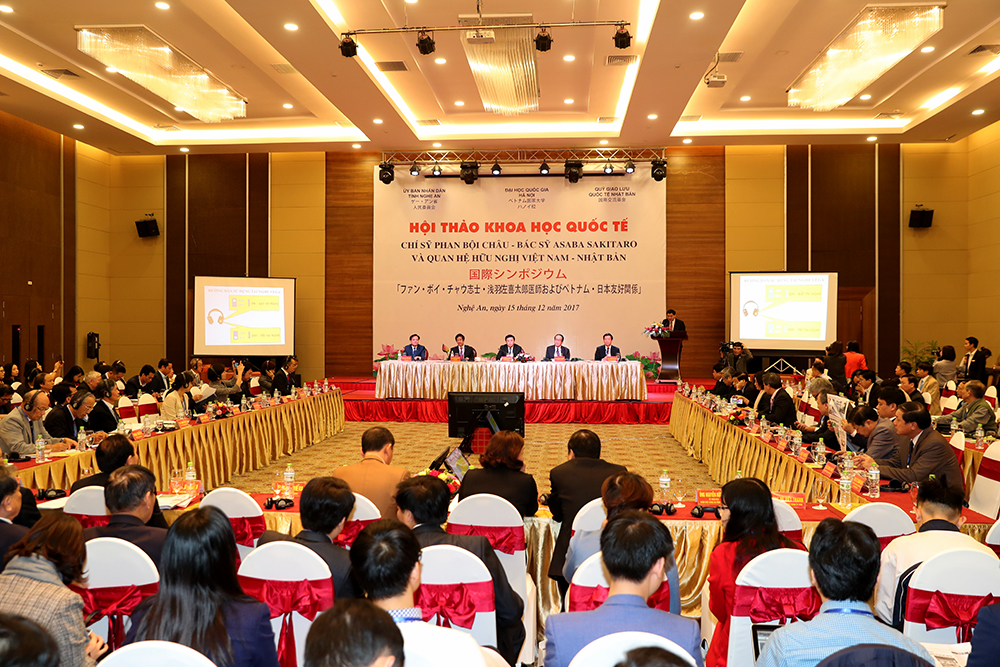
Overview of the workshop
3. In terms of expertise, at the Workshop, a number of reports focused on analyzing and clarifying the historical context, the political situation of the world, Asia and Vietnam in the late 19th and early 20th centuries. It was a period of great changes in regional and world political life. After a period of development and consolidation of power, capitalism had strongly penetrated Asian, African, Latin American countries... From the second half of the 19th century, imperialist countries increasingly revealed their ambitions to annex colonial peoples, conducting a series of wars of aggression, seizing land, competing for areas of influence and markets. In the confrontation with Western powers, before the power of modern weapons and the huge volume of goods of the European and American industrial economies, the independence and survival of Eastern peoples were posed as the most serious political problem and challenge.
In Asia, due to being deeply involved in economic and institutional conflicts, the Qing Dynasty feudal court suffered heavy defeats in the "Opium Wars" and was forced to open up and make concessions to the West. Meanwhile, in the island nation, Japan, despite being threatened by the West and having to sign many "unequal treaties", was still determined to carry out the Meiji reforms and achieved many important achievements. Japan's victory in the Russo-Japanese War of 1904-1905 as well as theNew book,NewsThe ideas of thinkers such as Rousseau, Montesquieu, Liang Qichao, Kang Youwei, Sun Yat-sen, Fukuzawa Yukichi... were like a breath of fresh air that swept through Asian countries, awakening regional societies. Many Vietnamese intellectuals, patriots, and revolutionaries turned to Japan with the belief in following Japan's path and hoping to rely on Japan to drive out colonial powers and regain independence and freedom for the nation.
Among the Vietnamese patriots in the early 20th century, Phan Boi Chau emerged as a central figure of the patriotic movement and in fact Phan Boi Chau became "hero, angel, martyr for independence, worshiped by 20 million enslaved people”[1]Phan Boi Chau was a great patriot, a great culturalist and thinker, leaving deep marks in Vietnamese history, in the journey of national culture and in the process of fighting for national revival.
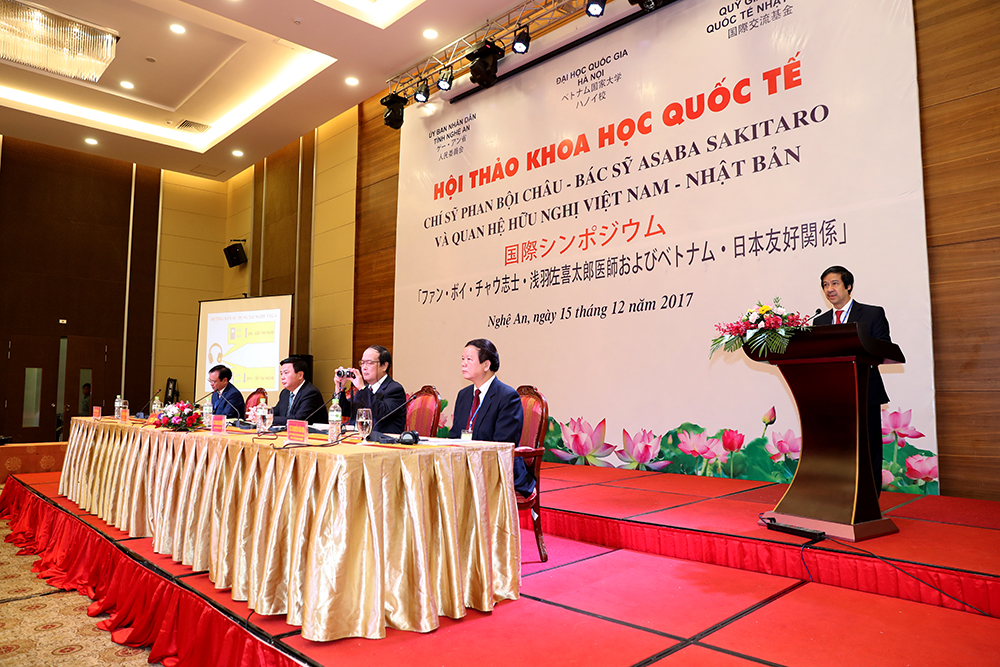
4. At the Conference, especially the presentations in Subcommittees 2 and 4, many reports analyzed in depth the factors leading to the formation of patriotism, the development process and the fundamental developments in Phan Boi Chau's patriotic thought. Due to the influence of new ideological trends, with political sensitivity and revolutionary experiences, Phan Boi Chau soon realized the limitations of feudal thinking and ideology and he understood that, in the context of capitalism pursuing an expansionist policy on a global scale, our nation's resistance against the French could not be organized only in a base area or any locality. For the resistance to be successful, it was necessary to be organized on a national scale. Moreover,To make the revolutionary cause successful, we need an organization, a political party, a platform, and revolutionary methods; we need a strong military force, modern weapons, solidarity with many social forces, and the support of patriots and revolutionaries in Asia and the world.. A broad political mindset, expanding the national vision outwards, inspired Phan Boi Chau's revolutionary thoughts and actions. In fact, not only did he seek support from Japan, China... in the process of revolutionary movementPan-Asianismwas formed in the patriotic thinking and actions of Phan Boi Chau.
On the journey to find a way to save the country, Phan Boi Chau and his comrades analyzed, considered, and chose between different locations and political forces (China, Japan, Siam, Germany, etc.) and finally decided to go to Japan to "ask for help". The famous Dong Du movement was formed from there and operated vigorously for 4 years (1905-1909). During that time, Vietnamese patriots received support from many Japanese social forces and achieved important achievements in the following areas: Building revolutionary spirit; building and consolidating patriotic organizations and focusing on training young intellectuals for the country. However, in early 1906, due to the Japan-France agreement, Phan Boi Chau and his associates had to leave Japan for Siam and then return to China to operate. With tireless efforts, Phan Sao Nam initiated, founded and became a key figure in many patriotic organizations such as:Duy Tan Association,East Asia Alliance,Dien - Que - Viet alliance,Vietnam Restoration Association…
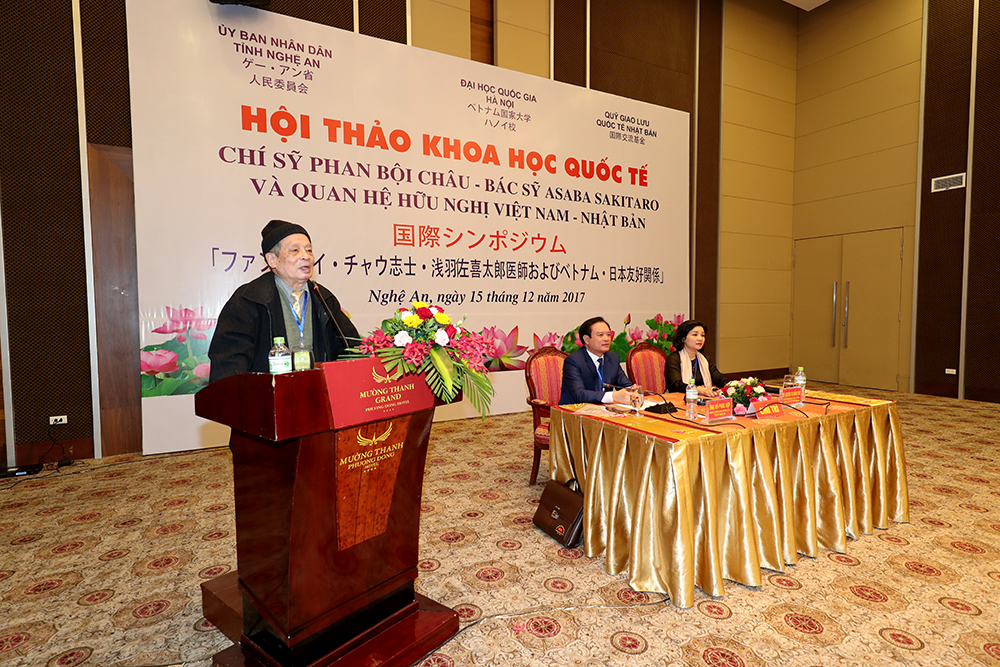
Through these organizations, Phan Boi Chau not only established solidarity and close ties with many Asian patriots and revolutionaries, but also won their support for the cause of liberation of the Vietnamese people. From founding and participating in revolutionary organizations and during the revolutionary struggle, experiencing successes and failures; Phan Boi Chau's ideology and motto for saving the country became increasingly perfect, clearly demonstrating the transformation from the policy of "appeal" luxurious "study"; from "violence" luxurious "innovation"; fromPatriotism,NationalismluxuriousRegionalismand reach outInternationalism. On the political side, research the political and social theories of Asian and Western thinkers such as: "Social Darwinism”, “Escape from Asia Theory" by Fukuzawa Yukichi, theory "China Conservation" of Okuma Shigenobu etc. Phan Boi Chau struggled and made efforts to fight for the establishment of new state models. From the policy of building a stateConstitutional monarchy(Japanese model), come supportDemocratic republic(the Bourgeois Democratic model of Sun Yat-sen), Phan Boi Chau finally expressed his attitude towards the modelProletarian State - Socialism, expressed admiration for Lenin and the October Revolution.
However, due to the limitations of the times, patriot Phan Boi Chau could not comprehensively approach, study the logical basis and reach truly profound perceptions of the proletarian state model as well as the role, function and mission of this state. That process was followed by later generations of patriots and revolutionaries, typicallyLeader Nguyen Ai Quoc developed to a new level, with a new level of awareness and creative spirit suitable to the reality of the Vietnamese revolution.. Placing the Vietnamese revolution in line with the world revolutionary movement, in harmony with the flow of the times, following the path of proletarian revolution, focusing on solving the most fundamental problems of an Eastern colonial agricultural country, leader Nguyen Ai Quoc - Ho Chi Minh founded the Communist Party of Vietnam, led our people to the success of the August Revolution in 1945 and carried out two sacred resistance wars, liberated the country, and completed the cause of national unification.
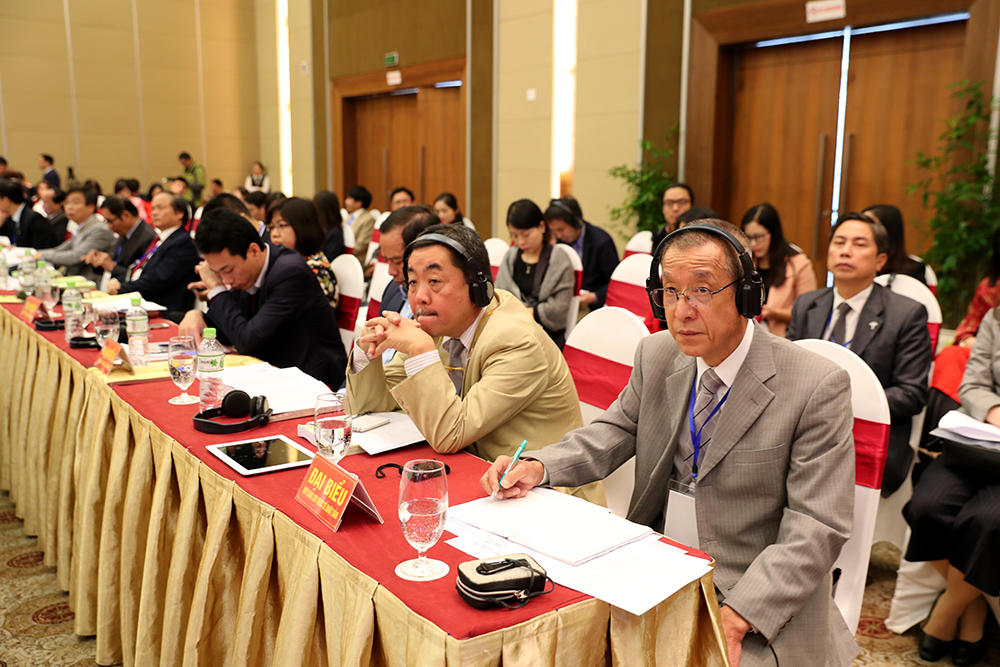
It can be affirmed that, with his rich patriotic activities and revolutionary enthusiasm, with the spirit of continuous self-study, self-improvement, and self-renewal, Phan Boi Chau basically always kept pace with the rapid changes of revolutionary movements in Asia and the world. Phan Boi Chau played an important role in the history of Vietnam in the first decades of the 20th century, having a strong influence on patriots of the same era and revolutionaries of the following generation.His personality, his courage, his revolutionary enthusiasm, his love for his homeland are forever engraved in the memories of millions of Vietnamese people and in the heroic pages of national history..
5. Not only was he an ardent patriot, Phan Boi Chau was also a great cultural figure of the country.To him, culture is politics, a movement to save the country, a way to gather forces and a weapon to fight the enemy.During his revolutionary activities in Vietnam, Japan, China, Siam... as well as during the last 15 years of his life under house arrest and surveillance in the capital city of Hue, Phan Boi Chau wrote hundreds of poems and compiled dozens of works in various fields from History, Philosophy, Political Science, Religious Studies to Literature, Arts... His works were integrated into the great collection "Phan Boi Chau Complete Works” (some new works, or new approaches and analyses continue to be introduced at this Conference), clearly demonstrating his profound academic level, love for his homeland and country, national sentiment and burning desire to always be ready to dedicate his life to the people and country.That is the courage, mettle, and intelligence of a patriot, of a revolutionary generation, but also the typical personality of a son of Nghe An.,but more broadly, of the cultural space of Nghe - Tinh, a land of "spiritual land and talented people", famous for its cultural depth, academic traditions, humanity and spirit of loyalty and resilience..
It can be said that, throughout his entire life, Phan Boi Chau devoted all his efforts to the cause of fighting for national independence.His literature and his calls for national salvation are the clearest, most representative and typical manifestations of his academic level, attitude, political thinking, fighting methods, iron will and revolutionary enthusiasm.In revolutionary activities and through his poems and literature, Phan Boi Chau always devoted all his thoughts and feelings to his homeland and country.understand the ultimate pain of a nation that has lost its country! In the workVietnam's history of national loss, He once wrote: “There is nothing more painful than a person who has lost his country, there is nothing more painful than a person who has lost his country discussing national affairs.”!
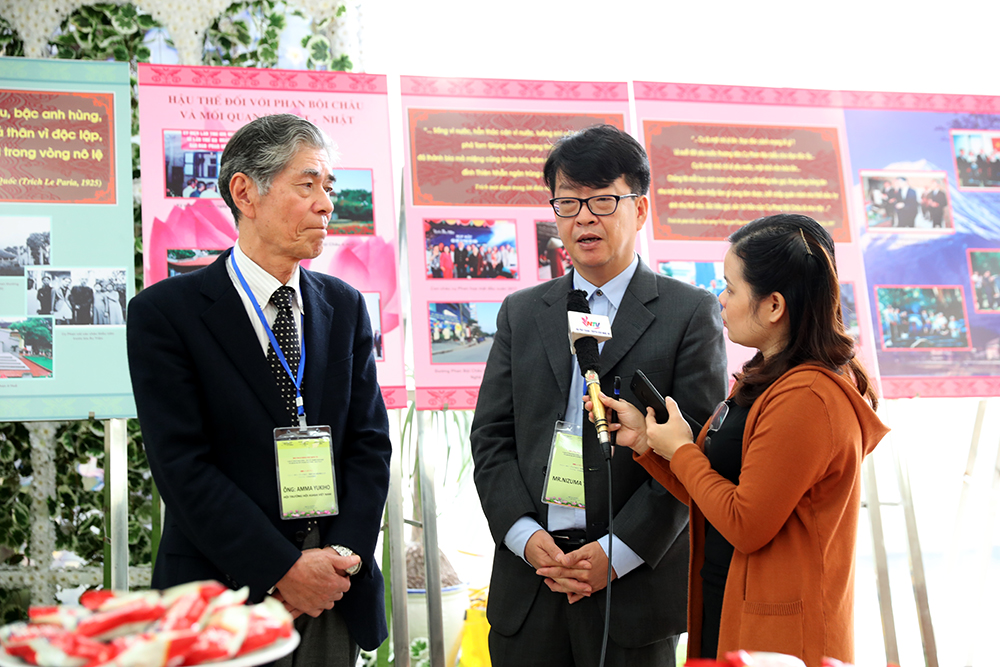
From the time he left his homeland for Japan in early 1905 until his death on October 29, 1940 in the imperial city of Hue at the age of 73, Phan Boi Chau's revolutionary career was a journey of tireless struggle and sacrifice. He was willing to go anywhere, do anything, not afraid of hardship or danger in order to achieve the ultimate goal of bringing independence and freedom to the Fatherland. On the journey to fight for independence, facing political challenges, the impacts of the world revolutionary movement, ... thanks to his intelligence and courage, the process of self-study, self-contemplation, and exchanges with revolutionaries and many Asian intellectuals,Phan Boi Chau was able to regularly approach and receive new ideological light on the path of revolutionary struggle, searching for new state models that he believed were necessary for Vietnam.. Phan Boi Chau also increasingly had more correct thoughts, perceptions, and assessments of the fundamental forces of the revolution. The working class, peasants, and the majority of laborers were always ready to actively participate in patriotic movements that could overthrow the domination of Western colonialism and the feudal system.
Although Phan Boi Chau's revolutionary career did not achieve his wishes, the path that the patriot had taken, the legacy that the patriot left behind, the burning national sentiment that Phan Sao Nam engraved... helped, motivated and enriched the vitality of the next generation of revolutionaries to fulfill the sacred mission entrusted by the Fatherland and the people.
6. At the Conference, many scientific reports in Subcommittee 3 focused on presenting and analyzing the special relationship and affection between Phan Boi Chau and Dr. Asaba Sakitaro. Understanding and admiring the will and patriotism and revolutionary spirit of Phan Boi Chau and the Vietnamese youth participating in the Dong Du movement, during the extremely difficult days of Duy Tan Association, Dr. Asaba spent a large amount of money to support the movement.The chivalrous act of Japanese doctor Asaba Sakitaro will forever be a beautiful symbol of the Vietnam - Japan friendship.It is very touching when we re-read the short letters Phan Boi Chau sent to Doctor Asaba and the doctor's sincere reply and quick decision to support Phan Boi Chau and the Dong Du movement.It is dedication, sacrifice for a greater cause.. The stele was created by Phan Boi Chau, with the help of the villagers of Iwata, Shizuoka province, in 1918.is a priceless message sent to future generations about the close, deep, pure, and loyal affection between two patriots, two great personalities in the history of friendship between Vietnam and Japan..
During the conference, some scientists also raised the concept of the need to recognize and evaluate the Eastern Travel movement in the historical flow of Vietnam - Japan relations. From the first contacts of monks from the kingdom of Lâm Ấp (an ancient kingdom in present-day Central Vietnam) who were invited to Japan to perform elegant music on the occasion of the inauguration of the Todai Ji Temple (Đông Đại Tự) in 752, the presence of Abe no Nakamaro (697-770) in Giao Châu in 753, to the vibrant development of Vietnam-Japan trade relations during the period of the Goshinjin Ships (1592-1635), the Đông Du movement (1905-1909), then the flow of Vietnamese students studying abroad in Japan during World War II (1939-1945) and the wave of studying abroad in Japan starting from around 1990 until now... The reports also clearly stated the goals, content and nature of each of those educational and cultural trends. In addition, some presentations also recognized the legacies of the Dong Du movement and the history of Vietnam-Japan relations as solid bases and foundations for consolidating and creating new developments in the current comprehensive, trustworthy, strategic partnership and cooperation between Vietnam and Japan for the peace and prosperity of the two countries as well as the Asia-Pacific region as a whole.

In addition, at the Conference, many scientists also focused on analyzing the patriotism, noble sentiments and relationships between Phan Boi Chau and Phan Chu Trinh and between the two patriots and Nguyen Ai Quoc and many other revolutionary patriots. It was not only a relationship of affection, trust and sincerity but also a continuation and, deep within, a passing on of the torch and the transfer of historical missions between revolutionary generations.Revolutionary spirit, mirrorThe sacrifices of patriots; the ideology, the will to sacrifice for the country and the noble sentiments, the close relationship between the revolutionary predecessors are the torch to light the way, the crystallization of the values, the sacred meaning of the patriotic tradition, the source of encouragement, the strong motivation for today's young generation of Vietnam to be more proud of the heroic history of the nation, more love for the homeland, to forge the mettle and more determination to rise up to defeat poverty and backwardness; to work creatively, to promote the spirit of entrepreneurship; to contribute to protecting the sovereignty of the territory, territorial waters and to build a rich and strong Vietnam..
7. At the Conference, Subcommittee 1 had many articles about the feelings and attachment of Phan Van San (Phan Boi Chau) to his homeland and country. For his homeland Nghe An and the Fatherland Vietnam, Phan Boi Chau always reserved the deepest, purest, and most sacred feelings.Nam Dan land, Nghe An, Lam river homeland has nourished the body and souland foster patriotism and revolutionary spirit of a child rich in ideals and ambitions. It is difficult to express in words the love and affection that Phan Boi Chau had for his homeland and for Vietnam, for his comrades, compatriots, for the people he met and worked with in Nghe An, Ha Tinh, Hanoi, Hai Phong, Thua Thien Hue, Quang Nam, Vinh Long and many other regions.It is the great sentiment of a great personality.. That sentiment was always multiplied during the years away from home, during the countless hardships of the national salvation movement. Looking back at Phan Sao Nam's revolutionary life, reading his works, whenever and wherever we always see a great sentiment for the people and for the country.
In deep consciousness and affection,The homeland and country always have deep and complete feelings for the patriotic scholar.. Since Phan Boi Chau prepared for the first activities of his journey to save the country, he has always received the protection, shelter, and valuable help of his homeland, family, friends, and comrades. During the years of carrying out the Dong Du movement, sending young people to study in Japan, or when he was active in Siam, in China, and then was arrested in Shanghai and faced the death penalty... Phan Boi Chau always received protection, enthusiastic support, and special affection from his homeland of Nghe An, Ha Tinh, from the people of the Central region, and from the whole country. The respect and affection of the people of the whole country for Phan Boi Chau when he was sentenced to life imprisonment or when he returned to live in the capital Hue, then his trip back to his hometown in the spring of Quy Suu year (1926) and even after his death... is the recognition and fair assessment of the people and history about the great contributions of a revolutionary, a cultural celebrity to the nation.

8. On the occasion of the 150th anniversary of the birth of Phan Boi Chau - Japanese Doctor Asaba Sakitaro and preparing for the 45th anniversary of the establishment of Vietnam - Japan friendship relations, the International Scientific Conference jointly organized by Hanoi National University and Nghe An province is a meaningful event and also a key activity in the series of events: Announcement Ceremony - Scientific Conference - Ceremony to receive the National Special Monument Certificate for the Phan Boi Chau Memorial Site.The results of the Workshop are a new step forward with many new discoveries in expertise and awareness in the research on the life and revolutionary career of Phan Boi Chau and his tireless contributions to the immortality of the nation, to the cause of preserving cultural heritage and sacred values of the country.The Conference has truly become a vibrant scientific forum between generations of researchers, between domestic and international scientists and has left many good impressions in the Vietnam - Japan friendship.
Obviously, when studying an outstanding revolutionary, a great cultural celebrity with a rich life of activities... we also see that there are still many issues and specialized content about Phan Boi Chau's life and career; the influencing factors, the circumstances of the birth of the works and the ideological values of the works; the change in perception and methods, the path of fighting for national salvation, about state models as well as the breakthrough thinking of Phan Boi Chau in the period of historical transition; Phan Boi Chau's relationships, collaborators, and areas of activity domestically and internationally, and his role in political organizations, patriotic movements, and the Vietnamese revolution, as well as the context and impact of Asian and world political factors on the Vietnamese revolutionary movements in the late 19th and early 20th centuries, etc. are topics that need to be further studied and clarified, and require close coordination between domestic and international experts, especially the participation of Japanese experts, in the work of collecting documents and conducting research.
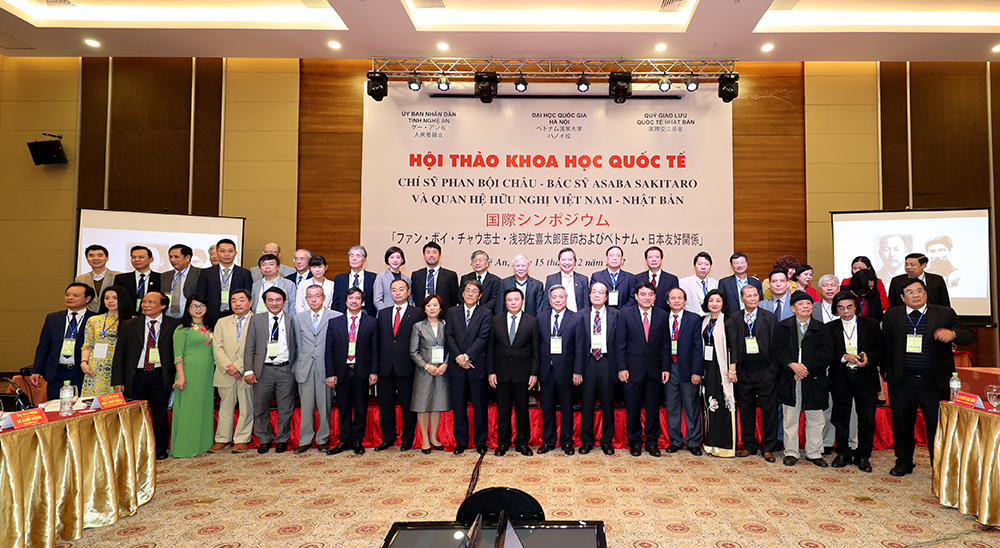
Once again, on behalf of the Organizing Committee and the Professional Committee of the Conference, we would like to express our sincere thanks for the attention, guidance and enthusiastic support of the leaders of the Party and State; the leaders of the Provincial Party Committee and People's Committee of Nghe An Province; the Party Committee and Board of Directors of the Vietnam National University, Hanoi; the Party Committee and Board of Directors of the University of Social Sciences and Humanities, VNU; the leaders of the Nghe An Provincial Political School, ... diplomats, political activists, social organizations, management agencies, scientific agencies, experts, researchers from Vietnam and Japan and all those who have worked with the highest spirit of effort, have coordinated, collaborated, contributed their efforts and intelligence to the common success, with many good results of the Conference.
Vinh City, Nghe An
December 15, 2017
[1]Ho Chi Minh: “The Farce or Varren and Phan Boi Chau”, printed in the newspaper Nguoi bien kho, Paris, issue 36-37, September & October 1925. Anthology of Vietnamese Literature, Volume 36, Social Sciences Publishing House, Hanoi, 1980, p.451.
Author:Prof. Dr. Nguyen Van Kim
Newer news
Older news